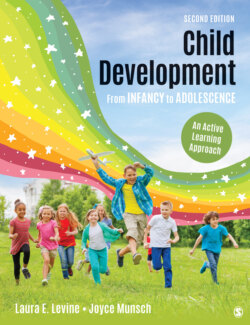Читать книгу Child Development From Infancy to Adolescence - Laura E. Levine - Страница 200
На сайте Литреса книга снята с продажи.
Behavioral Epigenetics
ОглавлениеWhat determines the way individual genes are influenced by environmental experiences? One answer comes from behavioral epigenetics, which is the study of the chemical reactions that activate and deactivate parts of the genetic material of an organism, as well as the factors that influence these chemical reactions. Behavioral epigenetics has been described as the bridge between nature and nurture (Zhang & Meaney, 2010). All living things have chemical tags that can turn a gene’s activity on or off (see Figure 3.9). While the structure of the genes remains the same, the way each gene is expressed may be very different depending on where and when these chemical tags are “turned on” or expressed, and this can be influenced by events or circumstances in the individual’s environment (Szyf & Bick, 2013).
Behavioral epigenetics: The study of the chemical reactions that activate and deactivate parts of the genetic material of an organism, as well as the factors that influence these chemical reactions.
T/F #10
The experiences you have in your life can change the structure of your genes. False
Description
Figure 3.9 Epigenetics.
Source: Courtesy of the National Human Genome Research Institute.
One example of how behavioral epigenetics works has been demonstrated by Michael Meaney, a researcher at McGill University, who studied rat mothers and their offspring. He and his colleagues found that rat babies reared by mothers who ignored them and did not touch them were more fearful and stressed by environmental events later in their lives, shown both by the babies’ behavior and by the levels of stress hormones they produced. These researchers were able to link this behavior with a particular gene that was active in babies reared by nurturing mothers but which had been “turned off” in the neglected babies.
To be sure that this effect was due to the mother’s behavior and not to her genes, the researchers switched babies between nurturing and non-nurturing mothers at birth, and the results were the same. In those babies who had been reared by non-nurturing mothers, the gene had been “turned off” by these early experiences even though their biological mothers were very nurturing (Diorio & Meaney, 2007). In an evolutionary sense, it appears that baby rats that do not experience adequate mothering “reprogram” their genes. The result of this reprogramming is that the babies respond more quickly to stress. The evolutionary advantage is that their increased responsiveness enables them to respond quickly when facing danger, rather than waiting for unresponsive mothers to protect them.
Similar results have been found in humans. Turecki and Meaney (2016) reviewed 40 studies (13 animal studies and 27 human studies) on the relation between early stress and later epigenetic markers in the genome. The human studies examined a history of trauma in early childhood, including child abuse and parental death. They found strong evidence for the effect of early stress on changes in the epigenome, which consists of all the chemical tags that can turn genes on and off, in parts of the brain that control reactions to stress. Individuals with these changes are more reactive even to lower levels of stress and more prone to depression and anxiety as a result.
Epigenetic response to stress. Highly stressful events early in life, such as the death of a parent, can result in changes in the individual’s epigenome that contribute to a higher incidence of depression and anxiety later in life.
©iStockphoto.com/Rich Legg
The effects of early life experiences on the epigenome and on later behavior also depend on the particular versions of genes, called alleles, inherited by the individual. For example, researchers have examined the role of both genes and environment in the development of children’s externalizing behavior, such as aggression and oppositional behavior (Windhorst et al., 2016). They focused on genes related to the production of dopamine, a chemical in the brain that is involved with motivation and the regulation of attention, emotion, and activity. Using genome-wide association, they found that children with different alleles for genes associated with dopamine responded differently to the experience of harsh parenting in early childhood. For children who had warm parenting, those who had one type of allele showed more externalizing behavior and those with a different type of allele showed less. However, for children who experienced harsh parenting, the type of allele they had did not relate to the degree of externalizing behavior. It appears that harsh parenting overrules the role of gene variance in the development of aggressive and oppositional behavior. These types of gene-by-environment interactions have also been found for different genes relating to depression, posttraumatic stress disorder, and negative emotionality in infants (Binder et al., 2008; Caspi et al., 2003; Green et al., 2016).
Allele: Different forms of one gene.
